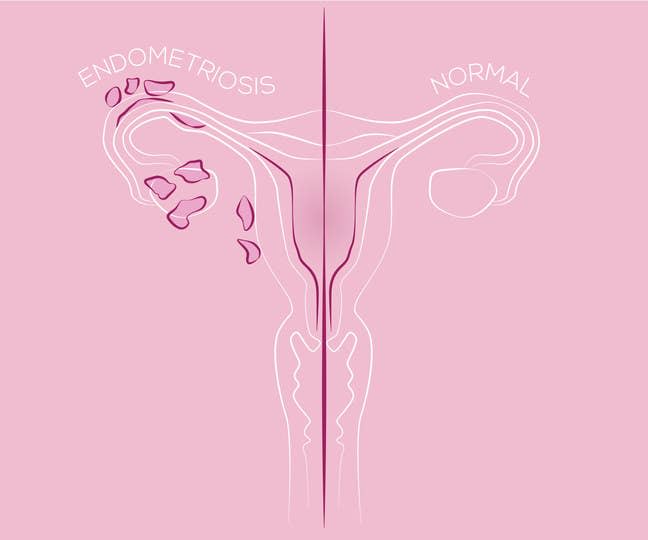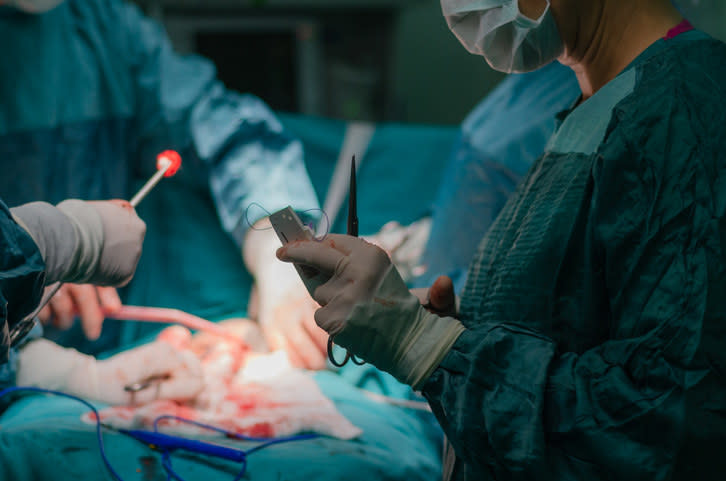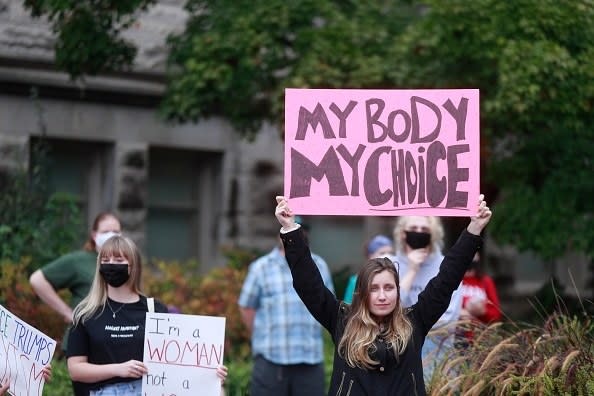This Woman Went Viral For Sharing The Sexist Reason She Was Denied A Hysterectomy, And It's Opening Up A Larger Conversation About Women's Health
Rachel Champ is a 27-year old sales agent from Longwood, County Meath, Ireland, who's currently completing a master's degree in criminology and criminal justice. She's also been dealing with debilitating periods and chronic pain since she was 10 years old.
"I still vividly remember getting my first period and curling into a ball on my bed in the fetal position and crying because of the pain. This became a new routine for me every month," Rachel told BuzzFeed. From there, Rachel spent the next 17 years being prescribed countless contraceptives and painkillers, though nothing truly alleviated her pain. And, since every doctor she visited simply wrote her off as "unlucky" for having "bad periods," she never questioned it.
"It wasn’t until I had my first pap smear test when I was 25 and spoke to the female doctor who performed it. She told me that it wasn't normal to be in so much pain every month that I couldn’t walk, missed work/college/events, and had to take so many painkillers just to function." That doctor referred Rachel to a gynecologist for the first time, and through even more tests and procedures — including an ultrasound, laparoscopy, and insertion of the Mirena coil — it was confirmed that she had multiple small cysts on both ovaries, and one cyst on her left ovary that appeared to be an endometrioma*. At this point, Rachel's pain had gone beyond her periods and was now both daily and chronic.

*Rachel mentioned that while she has not yet officially been diagnosed with endometriosis, she's been told that her symptoms seem to match the condition.
Despite receiving at least a partial diagnosis for what may be going on, Rachel continued to suffer month after month from debilitating pain with little to no options. She asked a male gynecologist she'd been assigned to by her healthcare system — who had been previously unhelpful and did not diagnose her cysts or endometrioma — about potentially pursuing a hysterectomy, since they'd exhausted so many of the non-invasive options. She told BuzzFeed, "After 17 years, and potentially another 20-plus years of this pain depending on when I go into menopause, I wanted to know at what point can I make the decision to have a hysterectomy to improve my quality of life, and put an end to the period pain I have experienced for nearly two-thirds of my life."
The doctor told Rachel he wouldn't perform the hysterectomy. Why? She was too young, her judgment was being "clouded by the pain," and she might want to have kids later. Rachel, who's gay and whose wife had accompanied her to the appointment, explained that she and her wife had already planned on pursuing adoption. His exact, word-for-word response was, "I don’t want you to have regrets if circumstances change for you. Maybe you leave your partner, your sexual orientation changes, and you meet someone and HE wants children."
NBC
Rachel decided to share her experience on Twitter, where her tweet immediately went viral with nearly a half million likes. She told BuzzFeed, "I wanted to share my experience — as I have with other aspects of my journey — to try and draw some attention to the barriers that women — specifically LGBTQ women — face every day trying to get basic respect and understanding from their healthcare providers."
Can’t believe that today a gynaecologist told me that a hysterectomy wouldn’t be considered as an option for my debilitating period pain on the off chance that I divorce my wife, my sexual orientation changes, I meet a man and decide I want children 🙃🙃🙃
Thousands of women FLOODED the replies with their own stories about being denied hysterectomies — and other forms of medical care — by medical professionals. And honestly? They're all pretty gross and demoralizing:
@RachChamp_ I can’t even get my OB Gyn to put me on the implant so the extremely painful periods stop. Her objection? What if I suddenly meet a man and suddenly decide I want babies right fucking now and I have to go through the hassle of taking it out of my arm.
@RachChamp_ Yep I was told this to. I already had 3 kids and I was single and they said what if you meet someone who wants kids? I responded we can adopt but why does an imaginary man have more say over my body than I do?
@RachChamp_ A (male) doctor once explained to my friend how she might want children sometime, so she could not get a hysterectomy, and when she mentioned adoption as an option if that became the case, he told her that adoption just isn't the same.My friend, *who is adopted*
@RachChamp_ I once spoke to a woman who, after she almost died giving birth to her 3rd child, was told in no uncertain terms that if she carried another pregnancy to term, it would kill her. She was STILL denied because "what if your husband wants more kids?". They literally thought her
@Sarcastic_hubby @RachChamp_ My coworker is turning 50, has 3 kids who are grown, went to her gyno cause she was bleeding excessively for almost 10 months straight and was told they won't do a hysterectomy in case she decides to have another child....at 50...
"BuT wHaT iF YoUr HuSbAnD wAnTs KiDs SoMeDaY?!" What if it's MY body and I should be able to make my own decisions about it, you fucking gargoyle?
TLC
Rachel told BuzzFeed that the response to her tweet has been "completely overwhelming...it's been incredibly humbling to receive so much support and kind messages from so many people in so many areas of the world. What surprised me the most is the number of people responding with their own stories so similar to mine. I found it really emotional and hard to read some of the experiences other people have had."
The responses to Rachel's tweet also show that her experience was not an isolated incident, and that there are plenty more stories out there from women who were denied hysterectomies for blatantly sexist reasons. And while there are technically no laws in Ireland or the US requiring women to receive spousal permission for the procedure, plenty of institutions still require it on their own.

"I think it really boils down to the fact that women aren’t treated as if we are capable of making decisions over our own bodies," Rachel explained. "In this particular circumstance, the problem is the idea that all women must want to have children. In my case, it shows that misogyny is so deeply ingrained in women’s healthcare, that a man who doesn’t exist is more important to my doctor than me — the very real patient sitting in front of him in tears begging for help to end the pain."
"If I was a man looking for a permanent form of contraception, I could book a vasectomy online right now without having to speak to a doctor. I’ve asked for a hysterectomy to be considered as an option after experiencing 17 years of debilitating pain, and every option that has been tried so far is not helping. In Ireland, women's birth control is prescription only, whereas Viagra is available in pharmacies with no prescription required. Despite a hysterectomy and a vasectomy both being permanent forms of contraception, women are fighting every day to be allowed to have a medical procedure, whereas men can book it online without speaking to a doctor."
CNN
"People are allowed to decline life-saving medical treatment even if it means they will die, but women are not allowed to make a decision to get a hysterectomy. Women only matter second to their reproductive abilities," Rachel told BuzzFeed.

When asked what she hopes others take away from her experience, Rachel responded, "Firstly, I hope it’s reassuring to anyone who has gone through a similar situation that they’re not alone. Just reading through the replies to my tweet show thousands of people who can relate."
Paramount+

